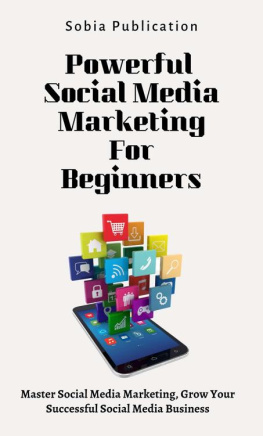Over the last decade, social media marketing has become an indispensable tool in the arsenal of brands and businesses of all kinds, with opportunities to build relationships, engage with customers, and increase sales like never before - and the stats back it up. A January 2014 survey by PewInternet revealed that 74% of adults in North America used social networking sites, including 82% of 30-49 year-olds and 89% of 18-29 year-olds. In addition, research from social media analysts Digitas predicts that the growth of social commerce could make it a business worth $30 billion before the end of 2017. And in a Social Media Examiner poll conducted in 2015, 91% of respondents said that social media marketing worked on for at least 6 hours per week - increased exposure for their business. If you're not using social media at all, or your current strategy isn't working for you as well as you hoped, now is the time to make a change. You are about to learn over 500 expert hints and tips to effectively market your business across all of the most popular social media platforms including Facebook, Twitter, YouTube, Google+, and Pinterest. Each chapter is grouped broadly into several sections including profile optimization, content strategy, and advice on paid advertising.
Success in social media marketing results from building strong and long-lasting relationships with customers and professional contacts, and sharing the type of content and expertise that they will want to share onwards to their friends, family, and colleagues. This approach will help to attract and keep loyal customers and connections, and encourage brand ambassadors to sell your business for you a complete reverse from the traditional marketing model! While this approach is a world away from the way traditional marketing works, this open, two-way communication is now what billions of consumers around the world expect from the businesses and brands to whom they invest time and money. Direct selling does have a place, but as youll learn, it isnt the front and center where social media marketing is concerned.
I hope you find the following advice helpful, whether you're a complete social media novice or a savvy individual looking for some extra expert tips to drive your business onto bigger and better things.
Andrew.
Before You Begin: Key Considerations For All Social Media Marketing
Peer pressure, success stories in the media and general hype tell todays business owners that having a presence on social media is essential. Thats not to say a business couldnt do well without utilizing social networking, but theyd certainly be missing out on a myriad of opportunities to build and grow. However, one of the biggest mistakes that a brand can make is to leap into social media marketing with no real clue of what they are going to do with it; only the vague hope it will somehow make their fortune. While there is a possibility that you get really lucky, in most cases this kind of unplanned approach will lead to unrealistic goal-setting, poor results, a huge waste of time, and ultimately a defeatist attitude that puts you off the idea of social media marketing completely. To ensure that this doesnt happen to you and to give you the best chance of success - I urge you to digest the key considerations for social media marketing detailed below. By the end of this chapter, you will have a firm understanding of what kind of approach works for business on social media, and how to take your efforts in a well-planned, logical direction.
Decide which social networks will work best for you
Unless you're a big company with the resources to plow full speed ahead into every potentially viable social platform, chances are you're better to focus on one or two core social networks first. It's better to excel on a couple of social networks than be mediocre on five or six, and while social media is (mostly) free, your time is valuable. Indeed, depending on the type of business you run, not every social media site is going to suit your marketing, your audience, or what you are trying to achieve. To help you decide where to begin, identify which social networks your target audience already "hangs out" or use customer personas and research of social network demographics to judge where you will best be received. Joining Facebook and Twitter is often a given for brands simply due to their sheer size and influence, but more "niche" communities with their own unique attributes - still with hundreds of millions of users, mind you - like Pinterest, Instagram, or LinkedIn, might be where you find can make an impact more successfully. You'll learn all about what each particular social network brings to the table as they are introduced in the chapters to come, but to start off, experiment with a couple of social networks where you can invest some significant time, track your progress, and then either build on your achievements with them, or steadily begin to experiment with other platforms on which you might have additional (or better) success.
Define and assess your goals
Before you start posting content to social media, it is useful to define the guiding themes and overall goals of your strategy, as these will help you shape the way you approach what may well become the linchpin in your marketing machine. I'm a fan of the SMART technique for creating actionable social media goals. Here's a breakdown, hopefully they'll help you too:
S pecific: Be specific in what you want to achieve. Do you want to raise awareness of your brand? Increase sales? Improve customer service? Strengthen loyalty?
M easurable: How will you know that your goal has been achieved? What analytics tools will you use to track your progress?
A chievable: Is your goal realistic? When you are just starting off, dont aim too high at the risk of being deflated if you dont hit your projected goal; getting really adept at all this stuff (particularly if you are approaching social media marketing seriously for the first time) takes a while.
R elevant: Is your goal aligned with your company's mission, vision and values?
T ime Specific: When do you want to have achieved the goal by? To add a focus to your marketing, stick to one overarching goal at a time, e.g. "I want to increase traffic to our website by 15% in the next 3 months" .
For example, if youre a shoe store owner and you normally sell 20 pairs of shoes a day, why not aim to use social media to help you sell 25 per day? After a good amount of time (at least a few months), evaluate where you are by using analytics tools, social insights (likes, followers, comments), and other metrics to help you track and measure your activity - you'll find lots more information on these shortly.











